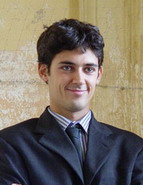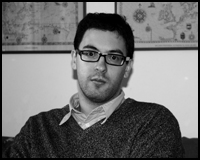|
Proceedings On-line |
 |
Grid Computing?
Grid Computing e' stata una delle buzzword del sesto programma quadro, tuttavia, anche se Grid Computing rappresenta una delle piu' interessanti evoluzioni del calcolo distribuito, esiste ancora scarsa chiarezza su cosa sia, su cosa si possa fare oggi e su cosa manchi per poter porre in essere un'efficace struttura di Grid Computing.
Alcuni dottorandi della scuola dell'Universita' di Genova hanno analizzato un insieme di problematiche e progetti Grid Computing al fine di fornire una, seppure frammentaria, interessante fotografia dello stato dell'arte. |
|
Programma Finale
Il Workshop si terra' il giorno Giovedi' 22 Febbraio 2007, dalle ore 9.30 alle ore 14.00, presso l'aula E5 al piano -1 del dipartimento DIST, in via All'Opera Pia 13, 16145 Genova.
Le presentazioni sono cosi' previste.
Ore 9.30 Nimrod. This paper discusses Nimrod, a tool for performing parameterized simulations over networks of loosely coupled workstations. Using Nimrod the user interactively generates a parameterized experiment. Nimrod then controls the distribution of jobs to machines and the collection of results. A simple graphical user interface which is built for each application allows the user to view the simulation in terms of their problem domain. The version of Nimrod called Nimrod/G is designed for the use in GRID applications, while the version called Nimrod/O is a tool for automatic design optimisation.
 |
Cristiano Ghersi was born in Genoa in 1981. He received the master degree in Electronic Engineering with laude from the University of Genoa , Genoa , Italy , in October 2004. In January 2005 he started a ten month-collaboration with CNR of Rome in the field of databases three-tier architectures. In January 2005 he has started the PhD in "Electronic, Computer Science and Telecommunication Engineering". His primary research interests are in the field of artificial intelligence. |
|
Ore 10.00 BOINC (Berkeley Open Infrastructure for Network Computing) is a middleware system for volunteer computing. This software system makes easy for scientists to create and operate public-resource computing projects. BOINC supports diverse applications, including those with large storage or communication requirements. PC owners can participate in multiple BOINC projects, and can specify how their resources are allocated among these projects. BOINC provides a feature called homogeneous redundancy and a mechanism of credit and accounting to control erroneous computational results due to malfunctioning computers or to malicious participants. In this paper it is described the design issues, the goals of BOINC, and the solutions to the main problems.
| |
Linda Ponta was born in Tortona (AL) in 1979. She received the master degree in Electronic Engineering with honours from the University of Genoa, Genoa, Italy, in March 2004. In the same year she has collaborated with the CINEF group at the University of Genoa. In January 2005 she has started the PhD in “ Electronic and Computer Science Engineering”. Her primary research interests are in the field of agent-based simulation and data analysis. |
|
Ore 10.30 Condor is one of the most powerful tool ever developed to support High Performance Computing on a distributed environment. The evolution of distributed systems to Grid Computing took Condor to the necessity to adapt its structure to the new-come paradigm: such next-generation step has been realized through the implementation of CondorG. In this survey, a deep analysis of Condor and its Grid-enabled evolution (CondorG) has been conducted to understand strenght and weakness points of such applications on a Grid architecture. Morevover, a set of proposals to improve the Condor approach to Grid Computing are presented.
-small.jpg) |
Alessio Merlo was born in Savona in 1980. In 2003 he got a B.Sc. in Computer Science "summa cum laude" from the University of Genoa. From 2003 to 2005 he was awarded an ISICT scholarship and in 2005 he got a M.Sc. in Computer Science "summa cum laude" from the University of Genoa. Currently he is a Ph.D. Student at the Department of Computer Science at University of Genoa where he researches scheduling methods in Grid environments. |
|
Ore 11.00 SUN Grid Engine
Francesco Panigo

|
Ore 11.30 Grid computing is a service for sharing computer power and data storage capacity over the Internet.
While some Grid projects may be able to operate with little or no security provided, major projects involving large virtual organizations have significant security requirements.
The security should be provided not only by the application, but mainly by the infrastructure.
This presentation aims to provide an introduction to some of the security issues that arise in collaborative distributed computing.
| |
Francesco Picasso obtained the “Laurea” degree in Engineering for Computer Science from Genoa University in 2005. He has worked as a freelance consultant and IT Instructor since 1996, providing design and implementations for custom software solutions, and holding courses mainly on security systems. From 2002 to 2005 he worked as a engineer in software development, and acquired experiences on design and development of Sip stack, Isdn stack, and CTI applications.
Since 2006 he is the recipient of the PhD Grant by Fondazione Carige on Intelligent Electronics for Security.
His main research areas include the use of intelligent systems to network security and data gathering, and the design/development of embedded systems for intelligent applications. |
|
Ore 12.00 H2O is a Java-based middleware for building and deploying distributed application. It has to be considered a component framework similar to J2EE. The key feature is that H2O removes the static binding between service deployment and resource provider. Therefore, any authorized third part is able to deploy components into the service container, not merely its owner. H2O is used by clients deploying computational services, and aggregating afterwards in meta-computing applications. Lightweight, scalable and low cost grid applications can be naturally composed with the H2O middleware.
 |
Roberto Podesta' was born in Genova in 1977. In 2003 he got a Laurea degree in Computer Engineering from the University of Genoa. Since January 1st 2004 he is a Ph.D. student at the Department of Communication, Computer and System Sciences (DIST) within the Faculty of Engineering of the University of Genoa. During the doctorate he cooperated with Marconi Communication (Ericsson Group) and he has recently been a research visitor of Prof. Rajkumar Buyya at the University of Melbourne (Australia) .
His main research interests include distributed computing systems and technologies, in particular Web Services, Grid-, Meta- and Parallel- Computing, and, more recently, Pervasive Computing, real-time applications, and embedded systems. |
|
Ore 12.30 Alchemi is an open source, .NET-based enterprise grid computing framework developed by the researchers at the GRIDS lab, at the University of Melbourne , Australia . Alchemi allows aggregating the computing power of networked machines into a virtual computer and developing applications to run on the Grid. The main features offered by the framework are:
· Virtualization of compute resources across the LAN/Internet
· Ease of Deployment and management
· Object-oriented “grid thread” programming model for grid application development
· File-based “grid job” model for grid-enabling legacy application
· Web Services interface for interoperability with other middleware
In this talk I shall cover the basic aspect of Alchemi I shall present a demo application.
 |
Christian Vecchiola was born in Sanremo in 1978. In 2003 he got a Laurea degree in Computer Engineering from the University of Genoa . Since January 1st 2004 he is a Ph.D. student at the Department of Communication, Computer and System Sciences (DIST) within the Faculty of Engineering of the University of Genoa . During his period of Doctoral Studies he worked with Siemens (in particular with the Siemens Automation and Drives division) and he has recently been a research visitor at the GRIDS (Grids and Distributed Systems) Laboratory, University of Melbourne, Austrialia, held by Prof. Rajkumar Buyya |
|
Ore 13.00 Griddles
Francesco Di Cerbo

|
|
|
|